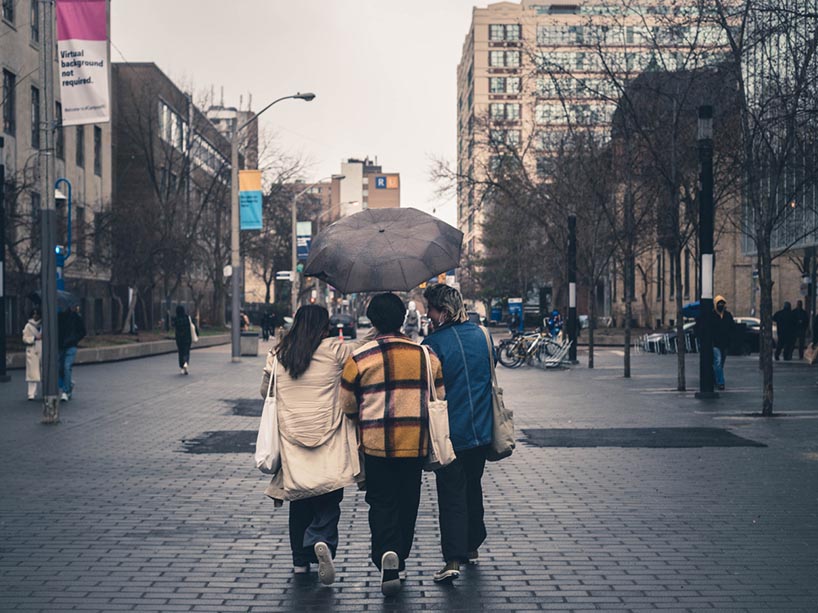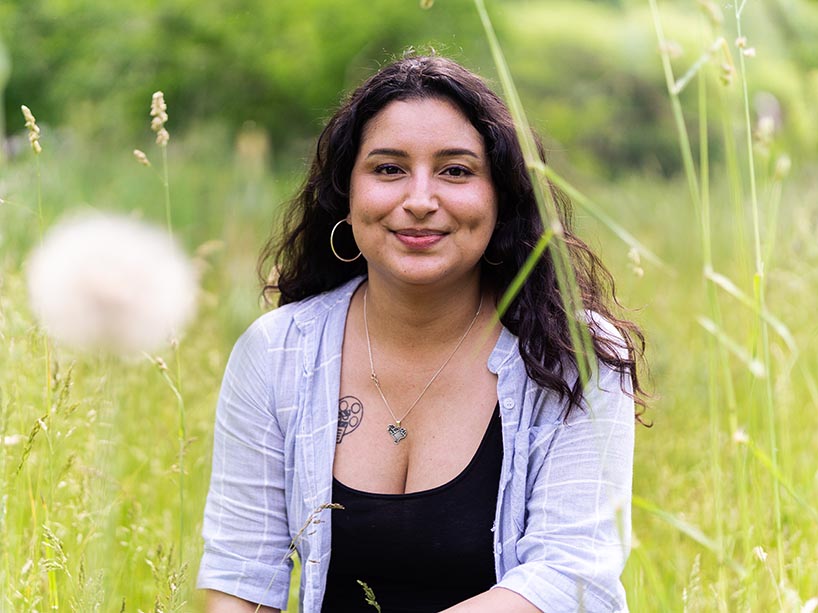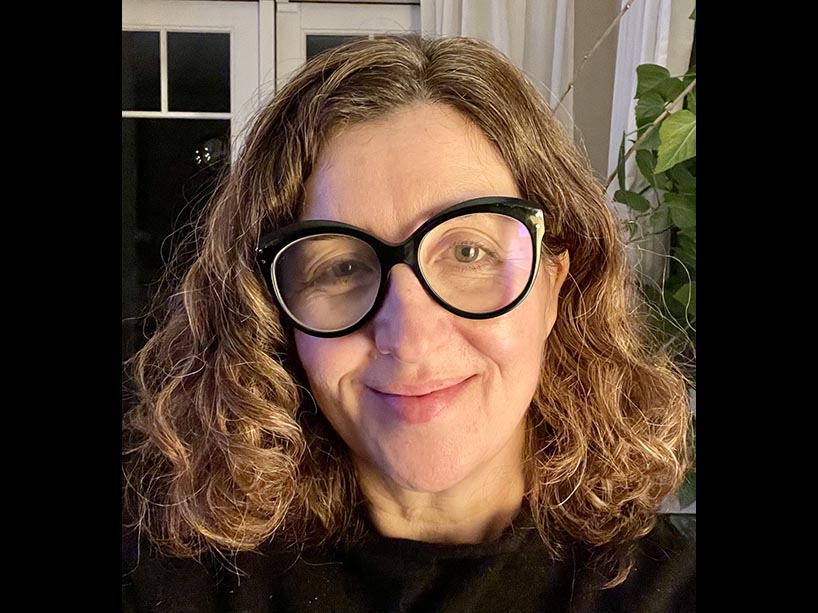New TMU research explores what we can learn from grief

Social work educators Jennifer Poole and Carmen Galvan explore grief, the ways it shows up in the classroom and what we can learn from it.
We are not alone in our grief or suffering. Nor are these feelings something we should work through on our own. Communal processing of grief is what underpins research led by TMU social work educators who see important lessons about community in bereavement.
“These are grief-saturated times,” says TMU social work professor Jennifer Poole. “The need for community, well-being and inclusive pedagogy has never been more critical. We need awareness of how individual and collective grief shows up in the classroom for both students and instructors, and strategies to confront it together.”
Poole, along with researcher Carmen Galvan, a School of Disability Studies instructor, social worker and co-founder of BIPOC Grief Talks, see grief permeating campus life in myriad ways. Their research, which also includes social work professor May Friedman, underscores the need for integrating grief literacy in teaching practices.
By cultivating deeper understanding of loss and bereavement they want to create more inclusive and compassionate educational environments.
For Poole and Galvan, grief can result from any significant experience of loss, in addition to the death of a loved one. This includes loss of housing, health, relationships, finances and employment.
Loss can also be connected to oppression, racism and violence—personal, and more encompassing such as a war. It can include a loss of community, loss or damage to the land, water and environment, or loss related to migration, relocation and dispossession.
“This work was conceptualized because grief was coming to class during and after the COVID pandemic, and exacerbated by conflict and multiple pandemics of violence,” says Poole. “It was coming to class unrecognized, often sidelined, and almost feared by both the learners and educators, which prompted us to ask, ‘how do we respond to this?’”


Carmen Galvan, instructor, School of Disability Studies and co-founder of BIPOC Grief Talks (top photo), with Jennifer Poole, professor in the School of Social Work, are sharing insights into grief literacy, a shared understanding on how to support people experiencing grief and loss in ways that bring connection and consolation and do not bring further harm.
Facing grief in the classroom
Foundational to Poole and Galvan’s research is critical grief pedagogy. This theoretical framework acknowledges that grief can be the result of systems of power like colonialism, neocolonialism, heteropatriarchy and neoliberalism. These systems affect and reflect rules for grieving.
“We live in a world that tells us that our inherent worth is based on our productivity,” says Galvan. “We see this with grief in the idea that the sooner you can get back on your feet, the more resilient you are, the stronger you are.”
As a grief counsellor Galvan has seen the long-term impacts when people don’t take time to deal with and process grief. This includes feelings of burn-out, mental and health issues and chronic pain and illness.
This distorted way of dealing with grief is why their research emphasizes the importance of learning with and from grief, rather than simply managing it. Managing it could include taking a few days off but with a focus on returning to full productivity. As Galvan explains, learning from grief means taking the time to process it, understanding that in some cases grief will become a permanent aspect of life as you readjust to a new reality.
“I teach a ‘Death and Dying’ class and have the privilege of being able to name grief right off the bat when I teach,” says Galvan. “I tend to find that naming the ways in which grief may come up in various situations is important for students, acknowledging grief and letting students know they are not alone in their experience.”
By examining how educators and students can make space for grief in the classroom, Poole and Galvan advocate for a more compassionate, collective approach to confronting grief.
“As a community, we need to better identify opportunities to cope with sadness and pain,” Poole says. “We need to better identify opportunities to learn with and from that grief, learning that can create community, augment well-being and transform pedagogy.”
Grief strategies to deal with loss
Critical grief pedagogy calls on instructors and learners to respond to injustices by making space for witnessing grief in the classroom and practising compassion in response.
"Recognizing that grief affects learning is crucial,” says Galvan. “Educators can provide support by connecting students with resources like Centre for Student Development and Counselling, showing empathy, offering flexibility around deadlines or even around navigating bureaucratic processes like obtaining a death certificate—which can take more than a month—and acknowledging that grief can come from various experiences, not just death.”
For the researchers, grief support can include:
- Acknowledging learners’ grief
- Giving grief time/space/attention during class
- Support outside of class time
- Creating flexibility around coursework or expectations
- Not pathologizing grief
- Connecting learners to resources and other supports
- Arranging or supporting a leave of absence (grad students)
- Holding space non-judgmentally/listening to understand
The power of addressing grief
Galvan says the work they are doing is changing attitudes about grief, accepting that it is a part of life and addressing the ways we are often shamed for showing emotion and negative feelings.
“Grief is sacred,” says Galvan. “Many pre-colonial teachings show us that grief moved people to do powerful things. It's important to think about the ways in which we honour grief, and not see it solely as a negative thing, but a catalyst for greater change.”
She emphasizes that grief should be a shared experience, not a weight to shoulder alone. "We are not meant to grieve alone; it's a collective process," she says, noting the healing that comes from shared spaces for grief.
Galvan also explains the need to grieve together over the challenges facing our world.
"Activists often hear, 'At least you're trying,' but that doesn’t erase the grief over the state of the world. Coming together to grieve that collective pain can help us to process it and use our pain towards our efforts."
Cultivating grief literacy on campus
To create more opportunities to create shared understanding about how to best support people experiencing grief and loss in ways that bring connection and consolation and do not bring further harm, Poole and Galvan have begun a project on first-person digital grief stories.
Twelve students, faculty and staff will create video narratives that express and share learning from loss and grief. The hope is that these will reveal ways to build community, enhance well-being and give insights to educators on how to confront grief in class.
This project is supported by a Learning and Teaching Grant through the Centre for Excellence in Learning and Teaching (CELT).
Related
